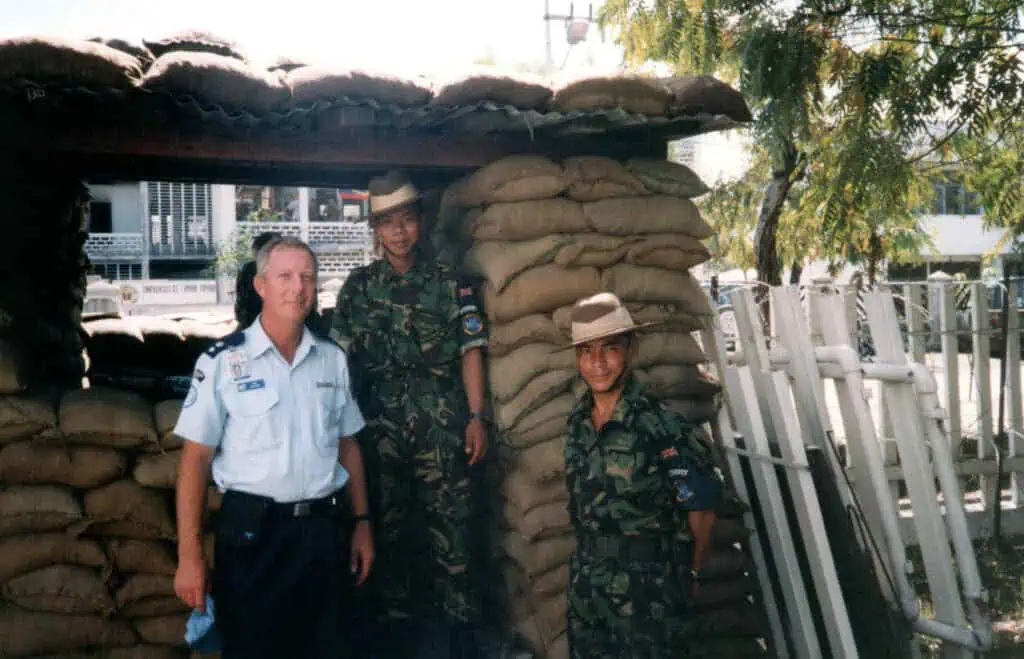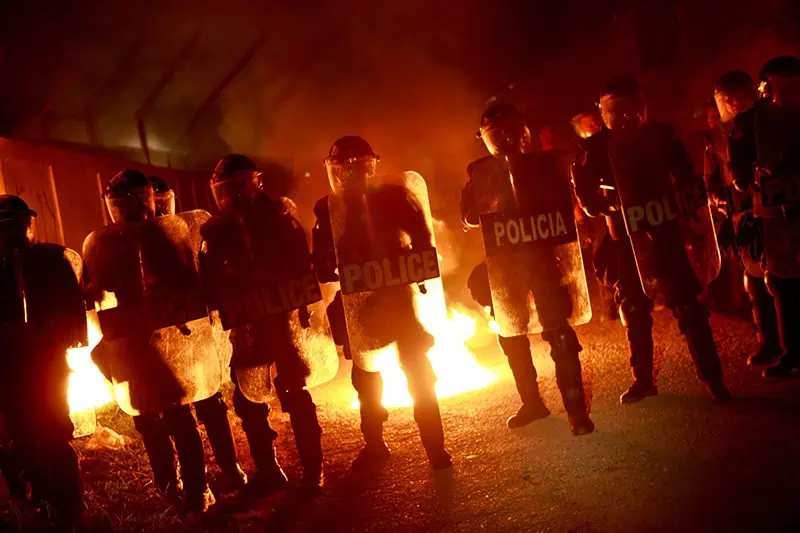Deadly Call of Nature
PROLOGUE
Readers of the September 2024 edition of the APJ will remember the article ‘East Timor’s Vote for Independence’, which recounts the story of the first Australian police contingent to deploy to East Timor with the United Nations (UN) in mid-1999.
The following remarkable story is written by a member of the second contingent, which was deployed in late 1999. This was after East Timor had been devastated by widespread violence and destruction, carried out by rampaging groups of armed militias.
During this perilous period, UN police mediated disputes, supplied basic policing services, and advised the International Force East Timor (INTERFET), the international military force responsible for maintaining security across East Timor.

URGENT CALL FOR HELP
It was late at night in the capital of Dili. My colleagues and I sat at our computers in the battered headquarters building, writing situation reports, when we heard a frantic call over the radio. It was Ghanaian police peacekeeper Senior Sergeant Joseph Doku urgently calling for assistance.
Joseph was a robust officer more than capable of handling himself, so we were alarmed by his calls for assistance. Once we pinpointed his location, three of us jumped into a patrol vehicle and raced as fast as we could along rundown roads to the scene.
Upon arrival, we saw several hundred locals surrounding Joseph and two East Timorese electricity company workers. The crowd was in a ‘mob frenzy’ and threatening the three of them with machetes, axes, and home-made weapons. Mob violence was a common (and often deadly) occurrence in East Timor at the time.
After pushing our way through the crowd, we reached Joseph, who said the electricity workers were the mob’s target and that we needed to get them to safety quickly. The four of us surrounded the two men and forced our way onto the main road, then told them to run for their lives. They did.
We returned to the centre of the crowd, where a male East Timorese stepped forward and accused the electricity workers of murder. He led me to an empty block of land, showing me a pair of ‘slides’ (slip-on sandals) lying in the grass. About a metre from the slides was an electricity cable, used to carry power between overhead poles. I asked what had happened, and the self-appointed spokesman insisted the electricity cable was live and had killed another man who had been at the neighbouring house. I was told the deceased’s body was taken by ambulance to the hospital.
THE BODY IS RETURNED
As we were talking, the ambulance returned with the body (in East Timor, bodies are returned to the family once pronounced deceased). It was unloaded from the ambulance and placed on the ground, covered by a sheet. I moved to examine the body; the crowd immediately started to stir again and threatened us with their weapons. The spokesperson shouted at us that we were disrespectful and should leave the body alone. I said that we needed to determine how he died (no, the hospital did not provide a cause of death). He then, reluctantly, allowed us to proceed but warned that it had to be done quickly.
Taking into account the cause of death as reported by the spokesperson, I began the examination. There were significant black burn marks on the soles of both feet, indicating exit points from electricity. However, I couldn’t find any entry points (we know that, with electricity, there is always an entry and an exit point to complete the circuit).
As it was now very late, we advised the family to take the body home, where it was quickly buried since there were no refrigeration facilities available. The crowd started to disperse, and we felt comfortable leaving the scene.
THE NEXT DAY
In the morning, we went back with INTERFET engineers and electricity company supervisors. The supervisors told us that the company had been working to supply electricity to that neighbourhood over the past two days. This included laying cables on the roofs of houses in preparation for connecting the houses to the electrical grid. Noticeably, all the houses in the area had tin roofs.
The INTERFET engineers examined the cable lying on the ground near the spot where the man had died. They identified it as not connected to any power source. However, they found that another cable in the field was “live”. It was attached to the roof of the house next to the vacant block. We were all surprised, as the electricity company had assured us that none of the cables had yet been connected to the grid.
After swiftly organising for all power in the area to be cut, we started a door knock nearby. We soon noticed several household extension leads running from one house to several others. The ‘source’ house was connected to the grid; the owner had chosen to supply electricity to his neighbours.
The INTERFET engineers and electricity company officials discovered that several extension leads had been altered (cut and rewired), exposing bare wires at various points. One of the exposed wires touched the house’s roof near the vacant lot, meaning both the roof and the electricity company’s cable were “live”.

CAUSE OF DEATH
After some careful thought about what had happened, we decided that the dead man had left the house to walk home when he needed to relieve himself. He chose to urinate in the vacant block. As the man urinated, his stream hit the live electricity cable. The electricity instantly travelled up the stream and entered the man’s body via his penis – an area we were definitely not permitted to examine! As the electricity travelled through the body to the man’s feet, the shock threw him into the air, while the slides were left where he was standing.
CASE SOLVED? – NOT QUITE
The house from which the extension lead came belonged to the spokesperson who had threatened us the night before and whipped the crowd into a frenzy. He was very meek and embarrassed when we explained what we thought happened.
Regarding the two electricity company workers attacked by the mob, they had merely been passing by and stopped to offer help. Furious and looking for someone to target, the crowd turned into a mob and assaulted the good Samaritans.
Ultimately, we were satisfied that it was a tragic but non-suspicious death. Due to the lack of enforceable laws, judicial, and administrative systems across East Timor at the time, there was nothing more we could do beyond submitting a brief patrol report. We couldn’t even take photographs of the scene because of the real risk of being attacked by the mob.
Another typical day in Dili!
ABOUT THE AUTHOR
Rod Walker served with the Australian Federal Police from 1980 to 2011. He worked both within Australia and abroad, including deployments with the United Nations in Cyprus and East Timor, and twice in the Solomon Islands on regional stability operations. He is the National Vice President of the United Nations Overseas Policing Association of Australia (UNOPAA)
Share this article:
Become an APJ subscriber now
Want to read more posts like this one and stay up to date with the latest in Australian policing news? Subscribe to the Australian Police Journal.